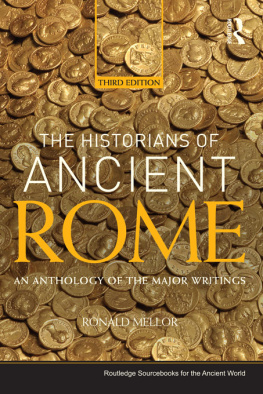BOOK XXVII.
Cneius Fulvius, proconsul, defeated by Hannibal and slain; the consul, Claudius Marcellus, engages him with better success. Hannibal, raising his camp, retires; Marcellus pursues, and forces him to an engagement. They fight twice; in the first battle, Hannibal gains the advantage; in the second, Marcellus. Tarentum betrayed to Fabius Maximus, the consul. Scipio engages with Hasdrubal, the son of Hamilcar, at Baetula, in Spain, and defeats him. Among other prisoners, a youth of royal race and exquisite beauty is taken; Scipio sets him free, and sends him, enriched with magnificent presents, to his uncle Masinissa. Marcellus and Quintus Crispinus, consuls, drawn into an ambuscade by Hannibal; Marcellus is slain, Crispinus escapes. Operations by Publius Sulpicius, praetor, against Philip and the Achaeans. A census held; the number of citizens found to amount to one hundred and thirty-seven thousand one hundred and eight: from which it appears how great a loss they had sustained by the number of unsuccessful battles they had of late been engaged in. Hasdrubal, who had crossed the Alps with a reinforcement for Hannibal, defeated by the consuls, Marcus Livius and Claudius Nero, and slain; with him fell fifty-six thousand men.
* * * * *
Table of Contents
Such was the state of affairs in Spain. In Italy, the consul Marcellus, after regaining Salapia, which was betrayed into his hands, took Maronea and Meles from the Samnites by force. As many as three thousand of the soldiers of Hannibal, which were left as a garrison, were here surprised and overpowered. The booty, and there was a considerable quantity of it, was given up to the troops. Also, two hundred and forty thousand pecks of wheat, with a hundred and ten thousand pecks of barley, were found here. The joy, however, thus occasioned, was by no means so great as a disaster sustained a few days afterwards, not far from the town Herdonea. Cneius Fulvius, the consul, was lying encamped there, in the hope of regaining Herdonea, which had revolted from the Romans after the defeat at Cannae, his position being neither sufficiently secure from the nature of the place, nor strengthened by guards. The natural negligence of the general was now increased by the hope that their attachment to the Carthaginians was shaken when they had heard that Hannibal, after the loss of Salapia, had retired from that neighbourhood into Bruttium. Intelligence of all these circumstances being conveyed to Hannibal by secret messengers from Herdonea, at once excited an anxious desire to retain possession of a city in alliance with him, and inspired a hope of attacking the enemy when unprepared. With a lightly equipped force he hastened to Herdonea by forced marches, so as almost to anticipate the report of his approach and in order to strike greater terror into the enemy, came up with his troops in battle-array. The Roman, equal to him in courage, but inferior in strength, hastily drawing out his troops, engaged him. The fifth legion and the left wing of the allied infantry commenced the battle with spirit. But Hannibal ordered his cavalry, on a signal given, to ride round as soon as the foot forces had their eyes and thoughts occupied with the contest before them, and one half of them to attack the camp of the enemy, the other half to fall upon their rear, while busily engaged in fighting. He himself, sarcastically alluding to the similarity of the name Fulvius, as he had defeated Cneius Fulvius, the praetor, two years ago, in the same country, expressed his confidence that the issue of the battle would be similar. Nor was this expectation vain; for after many of the Romans had fallen in the close contest, and in the engagement with the infantry, notwithstanding which they still preserved their ranks and stood their ground; the alarm occasioned by the cavalry on their rear, and the enemy shout, which was heard at the same time from their camp, first put to flight the sixth legion, which being posted in the second line, was first thrown into confusion by the Numidians; and then the fifth legion, and those who were posted in the van. Some fled precipitately, others were slain in the middle space, where also Cneius Fulvius himself, with eleven military tribunes, fell. Who can state with certainty how many thousands of the Romans and their allies were slain in this battle, when I find in some accounts that thirteen, in others that not more than seven, thousand were slain? The conquerors got possession of the camp and the spoil. Finding that Herdonea would have revolted to the Romans, and was not likely to continue faithful to him if he departed thence, he removed all its inhabitants to Metapontum and Thurium, and burnt it. He put to death the chief men who were found to have held secret conferences with Fulvius. Such of the Romans as escaped this dreadful carnage, fled half-armed, by different roads, into Samnium, to the consul Marcellus.
Marcellus, who was not much discouraged at this so great a disaster, sent a letter to the senate at Rome, with an account of the loss of the general and army at Herdonea; observing, however, "that he who, after the battle of Cannae, had humbled Hannibal when elated with victory, was now marching against him, and that he would cause that his present joy and exultation should not continue long." At Rome, indeed, the grief occasioned by what had occurred, and the fears entertained for the future, were excessive. The consul passing out of Samnium into Lucania, pitched his camp at Numistro, on a plain within view of Hannibal, who occupied a hill. He added also another demonstration of his confidence; for he was the first to lead out his troops to battle, nor did Hannibal decline fighting when he saw the standards carried out from the gates. However, they drew up their forces so that the right wing of the Carthaginians was extended up the hill, while the left wing of the Romans was contiguous to the town. For a long time neither side had any advantage; but the battle having continued from the third hour till night, and the first lines, which consisted, on the part of the Romans, of the first legion and the right wing of the allied infantry, on the part of Hannibal, of the Spanish soldiers, the Balearic slingers, and the elephants, which were driven into the field after the commencement of the battle, being fatigued with fighting, the first legion was relieved by the third, and the right wing of allied infantry by the left; while on the part of the enemy fresh troops took up the battle in place of those who were tired. A new and desperate conflict suddenly arose, instead of that which was so feebly maintained, their minds and bodies being unimpaired by fatigue; but night separated the combatants while the victory was undecided. The following day the Romans stood drawn up for battle from sun-rise till late in the day; but none of the enemy coming out against them, they gathered the spoils at their leisure, and collecting the bodies of their own troops into a heap, burnt them. The following night Hannibal decamped in silence, and moved on into Apulia. As soon as daylight discovered the flight of the enemy, Marcellus, leaving his wounded under the protection of a small garrison at Numistro, in command of which he placed Lucius Furius Purpureo, a military tribune, commenced a close pursuit of Hannibal, and overtook him at Venusia. Here, during several days, parties of troops sallying from the outposts, battles took place between foot and horses promiscuously, rather irregular than important, but which for the most part were favourable to the Romans. The armies were marched thence through Apulia without any engagement worth recording; for Hannibal marched by night, seeking an opportunity for ambuscade, but Marcellus never followed him except in broad daylight, and after having explored the country.










